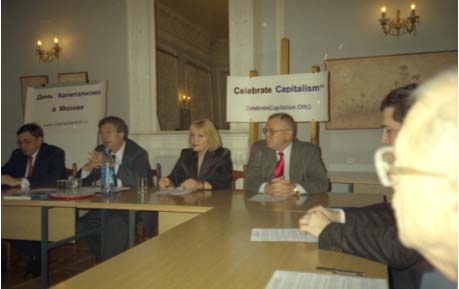THE FORTUNES OF CAPITALISM IN RUSSIA
On 3 December 2004 The Heritage Foundation (Moscow) and The International Friedrich von Hayek Foundation (Moscow) put on a meeting devoted to capitalism's fortunes in Russia. There was a significant participation of some 40 politicians, experts, journalists, and businessmen. Yevgeny Volk, Coordinator of Heritage's Moscow office, President of The International Hayek Foundation (Moscow) and Yuri Petukhov, Chief Coordinator ("C1" Moscow), The Hayek Foundation's Executive Director and Vice-President addressed the meeting with opening speeches.

Konstantin Mukulsky, Director of the International Institute for Social Development and Corresponding Member of the Russian Academy of Sciences, made a key presentation. He gave a detailed description of the current status and the prospects for capitalist development in Russia. He maintained that capitalism in Russia cannot be described in Marxist terms, like "bandit capitalism", "the initial-accumulation-of-capital stage", etc. Russia possesses postsocialist capitalism established by the socialist nomenklatura to serve its own ends. As a result, there emerged a state bureaucratic capitalism far removed from free-market ideals.
Russia's capitalism today lacks any sort of an ideological basis for political and economic development. The Russian leadership needs an idea capable of steering the country toward either democratic or anti-democratic development. The strategic vision does not overstep the bounds of seeking the enemy or proclaiming a superpower status.
The speaker underscored his lack of faith in the powers of intellectuals as an engine of Russia's civilized progress toward democracy and a free-market economy. Intellectuals are weak and separated. It is business can and should assume responsibility for the situation in the country.
Russian experts are not uniform in their understanding of what has already been accomplished and what is yet to be accomplished in Russia. Polls indicate a huge assessment gap in conjunction with the issue. Around one fourth of the Russian populace stand for a streamlined socialism, a little over 20 percent call for a combination of capitalist and socialist traits, and only 12 percent declare for a Western-type capitalism. In fact, society retains the Soviet model of the elite-business interaction based on the diktat of the powers that be.
The meeting participants emphasized that capitalism in Russia is yet to arrive. Futile debate as to where Russia belongs - the West or the East - is still ongoing. Myths of Eurasionism persist, and the elite cannot achieve an adequate self-identification.
But Russia is definitely a European country and belongs to the European civilization. In terms of the Hellenic-Roman cultural delimitation, however, Russia historically gravitates to fundamental knowledge, in a typically Hellenic way. This sets it apart from Western European civilizations targeted at specific, technological solutions and objectively shapes up its niche.
The discussion also focused on the need to improve corporate governance in Russia. Business transparency is a requisite condition for Russia's making headway toward this end. Business' social responsibility, which the Russian authorities refer to so much, should imply civilized process of corporate conflict settlement rather than extortion of money from entrepreneurs to fund government projects and agencies. The Joint-Stock Companies Act is among the examples of a successful parliament-business interaction in drafting legislation that regulates corporate governance.
The discussion participants concluded that it is early days for capitalism in Russia to be viewed as a fait accompli. The concept itself in application to our country should be specified with regard to today's realities.
Discussion participants entertained no illusions that Russia could achieve a fast-track and effective transition to capitalism and raise its living standards any time soon. The "muzzle" of the state capitalism would peep out in both economics and public life and articulate concrete decisions in domestic and foreign policy for a long time to come.
Such was this not especially optimistic mood, with which Russian advocates of economic freedom hailed the Celebrate Capitalism Day marked on 5 December 2004 in Moscow.